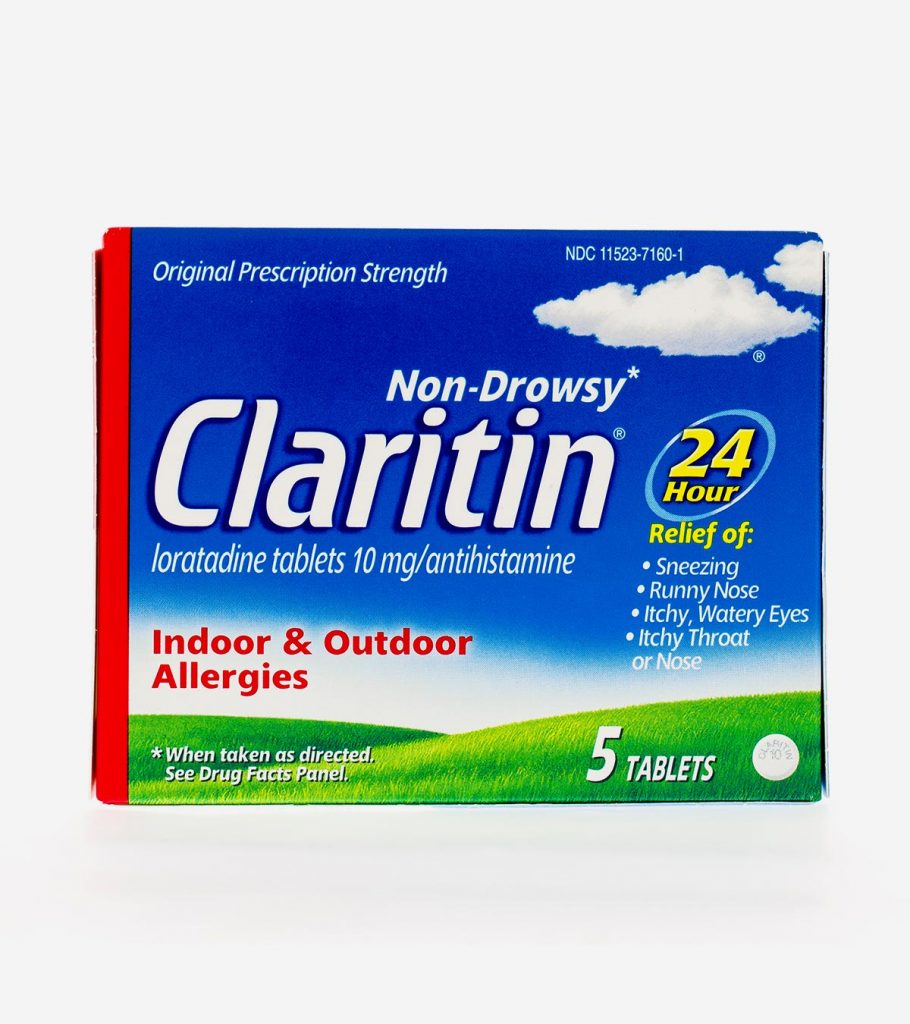Loratadine, commonly known by the trade name — Claritin, is a OTC medicine that is used to temporarily relieve the symptoms of hay fever or other allergies such as sneezing, runny nose, and itchiness of the eyes, nose, and throat. But is Loratadine in breast milk safe? It may help to know that while it helps relieve the symptoms mentioned above, it does not help manage hives or other skin allergies (1). Read this post to learn more about loratadine’s benefits, infant safety, and side effects for breastfeeding mothers.
Is Loratadine Safe While Breastfeeding?
Yes, it is safe but within limits. As per the recommendations of the British Society for Allergy and Clinical Immunology’s, loratadine can be taken at its lowest dose during breastfeeding (2).
Loratadine passes into the breast milk in low amounts but has minimal sedative effect.
The ingredients of Claritin and Claritin-D are safe while breastfeeding.
However, the doctor may not recommend loratadine during breastfeeding if the baby has low birth weight, was born prematurely or has health issues (3).
Your maternal health condition is also important: If you have liver or kidney disease, inform the physician before he prescribes the medication.
Even if you and your baby do not have any health conditions, you have to limit your intake of loratadine to small amounts as it enters the breast milk.
How Much Loratadine Does Breast Milk Absorb?
Six women were studied to understand the impact. When they took a single oral dose of 40mg, an average peak milk composition level of 29.2 mcg/L occurred two hours after the dose was taken.
Desloratadine is a major metabolite of loratadine. At 5.3 hours after the dose, 16mcg/L desloratadine occurred at peak level in milk. Over 48-hour time, a total of 11.7mcg of loratadine and its metabolite were excreted in the milk.
However, the dose taken by the women was four times more than the usual dose. And thus, with 10mg dose, a total dose of 3mcg would be expected in the breast milk (4).
The little amount of drug transfer that happens when the drug seeps into your breast milk may not have any adverse effects. But higher doses can prove to be troublesome.
Effect Of Loratadine On Breastmilk
If antihistamines are taken in relatively higher doses, the basal serum prolactin could decrease in non-lactating women and early postpartum women. But antihistamines do not affect the suckling-induced prolactin secretion. So, in a mother with established lactation, prolactin levels may not affect her breastfeeding ability (5).
In another study, one out of 51 nursing mothers, who were on 10mg loratadine for less than a week at four months postpartum, reported a decrease in the milk production.
If you notice any decrease in lactation while on Loratadine, talk to your doctor, as the drug may be having an adverse effect on maternal safety.
Note: Claritin-D has the decongestant pseudoephedrine, which is categorized as ‘moderately safe’ during lactation (6). However, some lactation experts opine that it can have a major negative effect.
Does Loratadine Impact Nursing Infant?
According to a survey conducted by Teratogen Information Service on 51 nursing mothers, who were on loratadine and had infants over two months old, two mothers reported minor sedation in their babies.
These mothers were on medication for one week or less and took a dose of 10mg each day. Other infant development issues, such as psychomotor skills and weight gain, were on par with the other infants in the control group, who were not exposed to the drug.
In an extension of the study, the researchers did not find differences in sedation or any other side effects in the infants of the mothers who took loratadine and those who did not (7).
It is a good idea to observe your baby while you are on this medication. Check if your little one displays symptoms like a rash or noticeable changes in her behavior such as heightened fussiness or irritability or sudden changes in her appetite or sleeping pattern. Always observe for sedation, exertion, and dry mouth.
Side Effects Of Loratadine While Breastfeeding
Loratadine usually produces no harmful side effects. But contact your doctor if you notice any unusual reactions in your body. Also, consult your doctor about any possible side effects of loratadine before you consume it. Prior information helps you prepare for any adverse reactions such as:
- Sedation
- Nausea
- Diarrhea
- Fatigue
- Headache
- Mouth sores
- Dry mouth
- Nosebleed
- Itchy eyes
- Sleep troubles
Seek medical advice if you experience any severe allergic reactions after using loratadine, such as:
- Severe dizziness
- Rashes
- Swelling of lips, face, throat, eyes or tongue
- Difficulty in breathing
- Itchiness
On the bottom line, loratadine is safe to use while breastfeeding. But, try harmless remedies such as steam inhalation or anti-inflammatory herbs.
If your doctor prescribes loratadine while breastfeeding, keep a watch on the side effects. Ask your doctor about the best time to take loratadine. For instance, you can take it just after nursing your baby to minimize the infant’s exposure to the drug.
Did you suffer from any allergies when you were breastfeeding? How did you overcome them? Share your experiences in the comment section.
Key Pointers
- Loratadine is a medication used to treat hay fever symptoms in nursing mothers.
- It can be consumed in low (recommended) doses during breastfeeding unless the baby is premature, has health issues, or low birth weight.
- As a small amount of it enters the breast milk, it may cause symptoms in breast-fed infants such as drowsiness, appetite changes, and dry mouth.
- However, reactions such as rashes, nosebleeds, diarrhea, fatigue, sleep changes, dizziness, or breathing problems require medical attention.
Loratadine is an antihistamine used to treat allergies. Learn about its uses, dosage, side effects, and precautions in this informative video.













